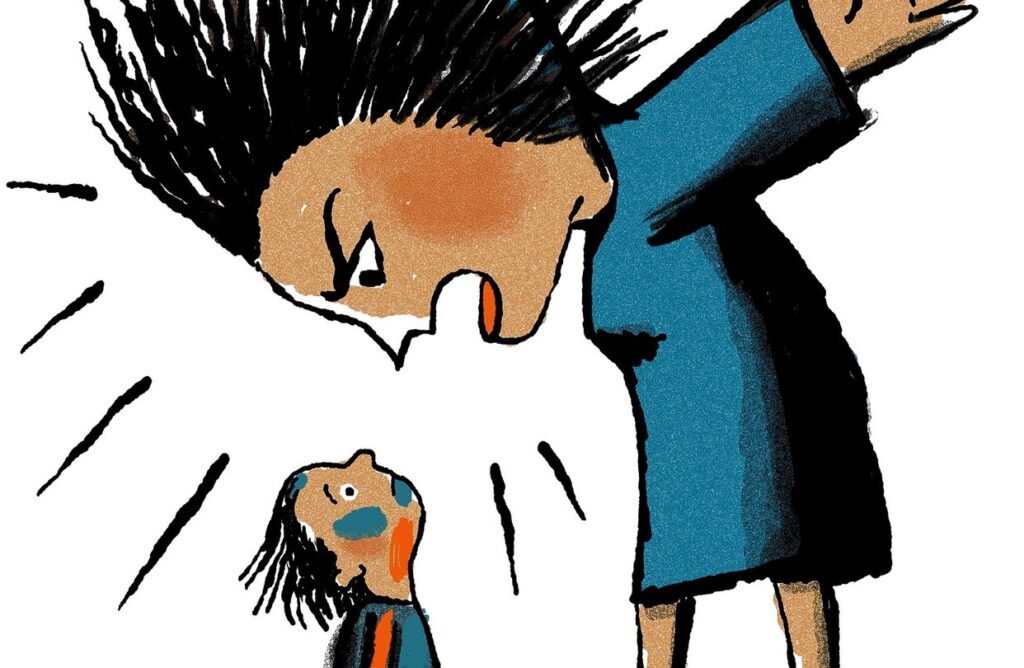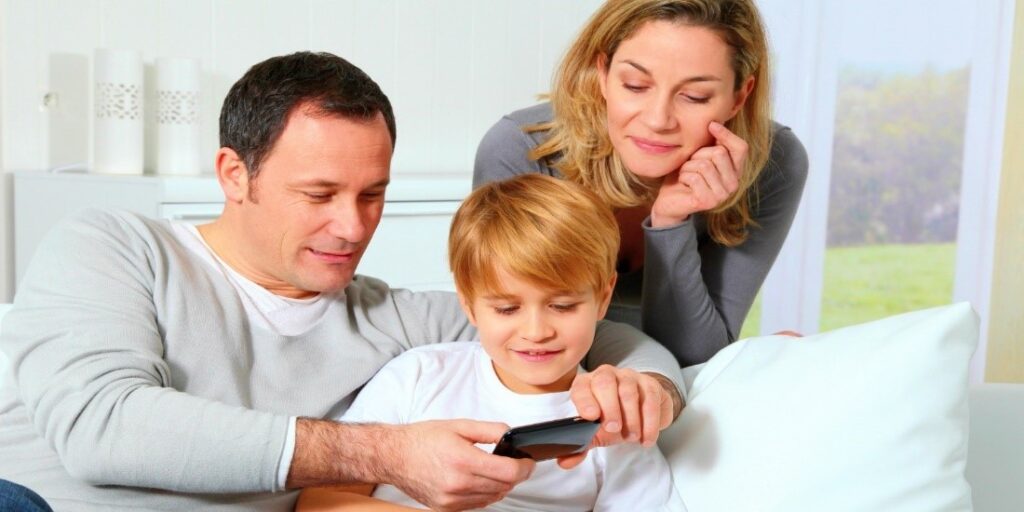
By Nadira Begim
Today’s world is a world of progress, a world of innovation. The World Wide Web has penetrated all spheres of society, and the institution of the family is not an exception. Just looking around: on the street, in a cafe or in public transport, one can see that parents and children are often glued to the screen of a smartphone or tablet. The influence of the Internet, in particular social media, on family relations and values today is becoming more and more relevant, causing concern among social scientists.
The importance of face-to-face parent-child interactions in the development of cognitive, language, and self-regulation abilities during early childhood is undeniable[1]. However, large amount of time spent by parents on the screen of mobile devices while caring for their child may be the result of the loss of some important interactions necessary for healthy attachment to the child. A negative parent and child attachment could potentially lead the child to increased incidences of tantrums, separation anxiety, and resisting of discipline.[2] Researches Sarah M. Coyne, Jenny Radesky (2017) argue that a there is a decrease in parent-child verbal interactions and play when the television is on or while parents use mobile media.[3] Frequent use of the media by parents can disrupt family relationships and negatively affect the child’s development, creating a sense of uselessness and unworthiness of parental love and attention.
The impact of social media use on parenting style

Parenting is a difficult task that takes time, health and requires patience, but at the same time brings a lot of joy. According to researchers, digital technology and the Internet have a huge impact on the behavior of parents in relation to children. For instance, Abe van Hatch (2014) found a positive correlation between parental use of social media and parenting style. Parents who reported higher levels of social media usage per day subsequently received higher scores in authoritarian parenting styles.[4] Maxwell Constantine and Chando Musingafi (2013) in their studies identified three parenting styles:
Authoritarian – these parents are extremely demanding, highly controlling and not responsive to a child’s feelings and set strict rules to try to keep order.
Permissive – parents such parents are accepting and warm but give up most control to their children. They do not set limits, and allow children to set their own rules. In addition, children raised by permissive parents are regarded as lacking self-discipline and social skills
Authoritative -the parents with an authoritative parenting style establish rules and guidelines that their children are expected to follow. This parenting style is democratic, and is considered by Aiger (2010) as a mixture of permissive and authoritarian parenting styles.
Interestingly, parents who spend a lot of time on mobile devices are more likely to use physical discipline, yell, criticize, scold, threaten and other negative consequences as a disciplinary technique. Also, parents who spend more time on social media per day tend to have a lower level of education.[5] Another scholar Maxwell Constantine (2013) who studied the impact of Facebook on child-parent bonding and parental authority over their children’s activities in Zimbabwe concluded that the Facebook has really stolen the relationship that used to exist between parents and their children.[6]
Parent’s use of social media has an impact on children
Parents’ own use of media can influence children’s media use, their attitudes regarding media, and the effects of media on children. For example, Wartella et al found that children whose parents on average spend about 11 hours/day on the screen, have more daily screen time as well. These families are more likely to be from lower socioeconomic strata and have lower educational attainment.[7]
Denise Ante-Contreras (2016) in his study claims that children are not yet mature enough to distinguish fantasy from reality, thereby, mass media has potentially harmful effects on the health and behaviors of children. “Children on social media may be more likely to be exposed to violence, bullying, and hate, which can have detrimental effects on their psychology”.[8]According to the study conducted by the Health and Social Care Information Centre in England, 11- to 19-year-olds young people with a disorder were more likely to use social media every day than those without.[9]
Thus, above-mentioned findings show that parents play a vital role in children’s use of social media. It is important that parents first of all need to understand the positive and negative effects of social networks and analyze how often they use them, and how much time a day they devote and spend with their children, because the subjective experiences of parent’s shape reality for their family culture. Undoubtedly, social media has a positive effect on both parents and children as well: they provide knowledge about society, opportunities for self-expression and creativity, and by participating in local and global online communities, parents and children feel part of the world. Moreover, parents can track their kids’ behavior on social networks like Facebook or Instagram and see what their kids are doing, what photos they post, or where they are, thus having some insight into their kids’ virtual life. However, it is necessary to balance virtual and real life. Today it is almost impossible not to use social media, but it is possible use social media wisely, not allowing them to destroy oneself and the world around. There are hundreds of ways parents can spend time with their child on social media, such as playing “smart” games, watching videos together and then discussing them.

These activities are useful for teaching digital media literacy to children and at the same time improving parent-child relationships. But first of all, parents should educate themselves and reduce the hours of using social networks, because the child is a “mirror” of the parents, observing the parents, the kids “absorb” the behavior of the parents. The family lays the foundations for morality, spirituality and tolerance. Thus, despite the negative impact of external factors on the family, it is important to learn how to maintain healthy relationships within the family in the digital era as a healthy strong family is the key to stability and prosperity of any society.
By Nadira Begim
Find Kairos Europe on Facebook
The views and opinions expressed in this article are those of the authors and do not necessarily reflect the official positions of Kairos Europe, its partners or their employees.
[1] Jenny Radesky, MDa, Alison L. Miller, at a. 2015. “Maternal mobile device use during a structured parent-child interaction task” Acad Pediatr https://www.ncbi.nlm.nih.gov/pmc/articles/PMC4355325/pdf/nihms634166.pdf
[2] Abe van Hatch. 2014.” Mother’s experience of social media: Its impact on children and Mother’s experience of social media: Its impact on children and the home the home”, Edith Cowan University
[3] Sarah M. Coyne, Jenny Radesky et al, “Parenting and Digital Media” 2017, Pediatrics November 2017 https://pediatrics.aappublications.org/content/140/supplement_2/s112.full
[4] Abe van Hatch. 2014.” Mother’s experience of social media: Its impact on children and Mother’s experience of social media: Its impact on children and the home the home”, Edith Cowan University
[5] Abe van Hatch. 2014.” Mother’s experience of social media: Its impact on children and Mother’s experience of social media: Its impact on children and the home the home”, Edith Cowan University
[6] Maxwell Constantine and Chando Musingafi (2013). “Impact of the Facebook on Parent-Child Relationship in the African Context: the Zimbabwean Experience” Zimbabwe Open University file:///C:/Users/Admin/Downloads/facebook.pdf
[7] Sarah M. Coyne, Jenny Radesky et al, “Parenting and Digital Media” 2017, Pediatrics November 2017 https://pediatrics.aappublications.org/content/140/supplement_2/s112.full
[8] Denise Ante-Contreras, 2016. “Distracted Parenting: How Social Media Affects Parent-Child Attachment” file:///C:/Users/Admin/Downloads/55336701.pdf
[9] Guardian, accessed in September 21. https://www.theguardian.com/media/2019/jan/15/impact-social-media-children-mental-health
